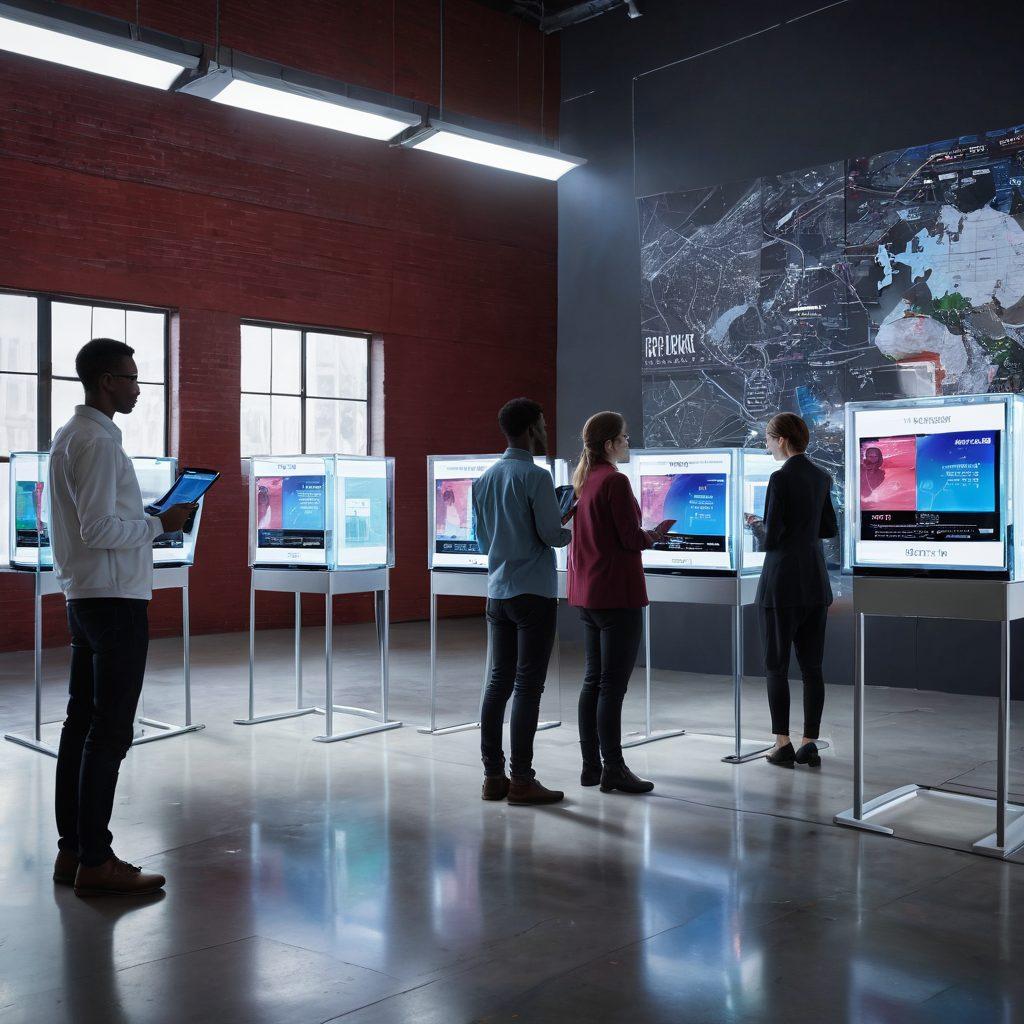Transforming Democracy: The Future of Digital Voting and Civic Engagement
In an age where technology shapes our daily lives, it’s fascinating that traditional voting methods have remained largely unchanged for decades. However, as the world moves forward, so must our approach to civic participation. Imagine a future where casting your vote is as effortless as clicking a button on your smartphone. Digital voting is not just a concept for tech enthusiasts; it represents a revolutionary shift in the electoral process that can enhance civic engagement and transform the way we approach elections. This blog will delve into how digital voting can boost voter turnout and create a more inclusive democratic process.
"Every election is determined by the people who show up." This quote, often attributed to Larry Sabato, underscores the power of participation in shaping our democracy. With traditional voting methods, many individuals find it challenging to make their voices heard. Digital voting, particularly through online polls and vote-by-mail initiatives, can break down barriers to participation. By simplifying the vote casting process, we can motivate not only those who regularly engage in political discourse but also those who have previously felt disenfranchised or overwhelmed by the complexity of the electoral process. Imagine a world where civic participation is accessible to everyone, regardless of their circumstances. How can we make that vision a reality?
One undeniable benefit of digital voting is its potential to increase voter turnout. Studies show that when people are offered the option to vote online, the likelihood of their participation significantly increases. Why? Because digital voting allows for more flexibility and convenience. Consider the millennials and Gen Z voters—digital natives who have grown up in a world that embraces technology. If we want to mobilize their voices in elections and referendums, we need to meet them where they are: on their devices. Thus, embracing internet voting can be an essential step toward enhancing electoral engagement among younger demographics. What would happen if politicians took their campaigns online to meet these constituents?
Moreover, digital voting can enhance public opinion by recording votes in real-time. The integration of election technology not only streamlines the balloting process but also helps in gathering data on voter preferences and trends, creating a more vibrant dialogue about the issues that matter. When citizens feel their opinions are actively sought and valued, they're more likely to engage in political participation and discussions, thereby fostering active citizenship. Imagine being part of a system where your feedback could influence the political landscape almost instantly. Wouldn't it empower you to advocate for your beliefs more passionately?
The dream of broadening voting rights shouldn’t be far from our minds. With technological advancements, we have the tools at our disposal to ensure that every voice is heard, and every vote is counted, regardless of socioeconomic barriers. Civic tech solutions can provide tailored resources to help individuals navigate the electronic voting landscape successfully. By making voting more transparent and reparative, we can build a more robust electoral democracy where every participant feels like an integral part of the process. As we move toward the future of digital voting, let’s collectively rethink how we perceive civic participation. How can we create an environment where every citizen, from every walk of life, feels empowered to vote?
From Polls to Pixels: The Impact of Technology on Electoral Engagement
In today’s hyper-connected world, the transformation of democracy is clearly visible, especially when it comes to electoral engagement. Think back to the days of long lines at polling stations or the rustle of ballots being cast behind closed curtains. Now, imagine a scenario where the power of your vote lies not just in your physical presence at the polls, but also in your fingertips, accessible through a screen. This shift from polls to pixels signifies a crucial evolution in how we engage with the electoral process, making a strong case for the benefits of election technology and digital voting. So, how can technology reshape the very essence of civic participation?
Let’s consider the impact of digital voting on voter turnout. Studies have shown that when voting becomes accessible through online polls or vote-by-mail options, the enthusiasm for political participation rises. For instance, in the 2020 elections, several states implemented mail-in voting procedures due to the pandemic, leading to a remarkable increase in voter turnout. When people realize that casting a vote can happen while sipping coffee at home or with a quick click on an app, isn't it likely that they’ll be encouraged to participate? A simple question arises: What if our next election could be a click away from even larger participation?
Reflect on the concept of civic tech—how technology can enhance our engagement in the political discourse. Platforms that support online voting and accessible resources during elections can empower citizens to make informed choices. They serve not just as tools for vote casting, but as gateways to understanding complex policies, engaging in referendums, and fostering active citizenship. Consider how public opinion might shift when every individual feels they have the information and power to be a part of the electoral democracy they live in. Wouldn’t this transformation support more robust conversations about our leaders and policies?
While the increasing reliance on internet voting offers enticing promises, it raises pressing questions about security and privacy. As we embrace digital methods, we must also prioritize safeguards against potential cyber threats that could undermine the electoral process. After all, what good is a digital revolution in voting if it's susceptible to hacking or human errors? Here lies a challenge for our technology experts and government officials—the need to balance innovation with the integrity of the ballots. How can we ensure trust in these systems to avoid disenfranchisement or manipulation?
Ultimately, the conversation about voting rights and the future of technology in elections must continue. As local governments explore various methods of electoral engagement, from vote-by-mail to full-blown digital platforms, citizen awareness and involvement become critical. This is not just about making voting easier; it's about ensuring that every voice is heard, that every opinion matters. So, are you ready to embrace the change? Together, we can champion a future where engagement and participation redefine our democratic systems, leading us toward a more inclusive, informed, and dynamic electoral landscape.
Empowering Voters: Exploring the Future of Online Voting and Political Discourse
Imagine a world where casting your vote is as simple as clicking a button on your smartphone. The evolution of election technology is paving the way for a future where digital voting and civic engagement are at the forefront of modern democracies. With the rise of the digital age, empowering voters through online voting platforms not only enhances voter turnout but also fosters active citizenship. How can we ensure that this digital transformation leads to an electoral process that is accessible, transparent, and secure for every citizen?
Digital voting is more than just a convenience; it's a revolution in how we perceive civic participation. Gone are the days of long lines at polling stations and painfully slow ballot counting processes, as we embrace the potential of vote casting via online polls and internet voting. It's a powerful tool that has the capability to reshape political discourse by making it easier for citizens to express their opinions during elections and referendums. Yet, as we prepare to expand our methods of participating in democracy, how can we balance innovation with integrity?
Civic tech is emerging as a driving force in the transformation of electoral democracy. It empowers voters, ensures that their voices are heard, and facilitates a more inclusive political environment. Companies and organizations are developing platforms that not only assist in vote-by-mail services but also provide resources for understanding complex issues affecting public opinion. This technological leap opens doors to dialogues that deeply influence political participation, enriching our communities while contributing to an informed electorate. How can citizens harness these tools effectively to engage in meaningful political discourse?
While digital voting could drastically improve the electoral process, we must also address the challenges that come with it. Concerns about cybersecurity, data privacy, and fraud are at the forefront of everyone's minds. How can we ensure that this new era of voting rights is protected against potential threats? The answer lies in adopting advanced security measures, providing thorough education about the systems in place, and encouraging a culture of transparency in online elections. It is critical that as we explore these technological innovations, we also prioritize the integrity of every vote.
The future of online voting and civic engagement is bright, but only if we collectively commit to fostering an environment of trust and transparency. This means involving every stakeholder in the conversation—civic organizations, decision-makers, and, most importantly, the voters themselves. By encouraging dialogue and collaboration, we create a community of informed citizens who feel empowered to participate in the electoral process. The transformation of democracy begins with us, the voters, embracing the incredible possibilities of digital voting while demanding accountability to ensure that our democratic values are upheld. Are you ready to take part in shaping the future of democracy?


